On Sunday, November 6, 1994, NBC began broadcasting a new science fiction television program in the 7:00 PM Eastern / 4:00 PM Pacific time slot.
It was a show the whole family could watch, depicting the hardships of a group of human colonists settling a new world 22 light years from Earth. Inexperienced, alone, and cut off, these colonists have no one but themselves to rely on as they struggle for survival, learn to live with each other, make contact with the planet's natives, uncover treachery among their own kind, and stake a bold new claim for humanity's future. Determined to give their children a fighting chance to live on a world as beautiful as Earth was before mankind ruined it, the colonists learn to live in an environment which shapes them and molds them, and they discover along the way just how much they have to learn, and how much they have in common with life on the other side of space. They learn about their weaknesses, their fears, and how much potential they really have. They learn about second chances, and how precious they can be.
The show was called Earth 2, and it was the most beautiful, best damned television show in history.
At the time, the television market was drowning in an ocean of testosterone, meaningless laser-light shows, disgusting material passed off as humor, and cheap melodrama passed off as depth. In the middle of this ocean of garbage, Earth 2 was a vastly needed breath of fresh air. Judged on its own, it shines with a quality other shows can't even dream of. Compared to them, it blazes as brightly as the sun.
Discovering Earth 2
Sometime around October 1994, I opened a science fiction magazine (perhaps an issue of Starlog) and saw an ad for Earth 2. It was the first I'd heard of it, but that one-page advertisement grabbed my attention immediately. It showed a group of people dressed in ordinary clothing, standing in a meadow with a blue sky beyond. Two of the people were children, a boy about 8 and a girl about 10.
None of these people were brandishing weapons. They weren't dressed in uniforms. They weren't striking ridiculous poses to look as tough and as macho as they could. They looked like ordinary people, people like you and me.
I don't remember what the caption said, but something about the ad struck me. Perhaps the agency who put the ad together was just on the ball that day. Whatever the reason, I could see this was something different, that whatever this show was going to be about, it was to be set on a beautiful new world, featuring ordinary people caught up in extraordinary events, struggling for survival.
I hadn't tuned in to a new television show in years. They all resembled each other, and the networks kept canceling them and coming out with identical shows the next year. So I surprised myself more than anyone when I went out of my way to make sure I was in front of a TV screen on the evening of the first Sunday in November.
I was a band student in high school, and we often took part in competitions. My band instructor would often tell us that the sign of a good performance was when the judges simply put down their pens, sat back, and enjoyed.
From Earth 2's first moment, I – television critic and cynic ad nauseum – just sat back and enjoyed.
Trying to explain how wonderful, how easy it was to watch Earth 2 is like trying to explain how easy it is to breathe. It was of such a nature that it slid right into my eyes, my ears, my heart, and my brain without even trying. It was like putting on a well-worn and much-loved jacket, or resting in a comfy chair I'd been familiar with for years. It was as if I had discovered something I'd been looking for all my life, without even knowing I was seeking anything at all.
It was just so natural to watch that show. That's the best way I can put it.
I didn't tape that first episode, because I didn't know I would grow to adore it so much. But I was there faithfully for the second episode, eager for more of this refreshingly new show. The action of coming back for more of a new TV show was unusual for me, yet it never struck me as odd at the time. I simply did it without thinking, because watching that show was as natural as breathing.
Starting with the third episode, I began taping. By the end of the fourth episode, Earth 2 had supplanted Doctor Who – a 15-year favorite of mine – as the television show nearest and dearest to my heart. I was hooked. Happily, completely, loyally, unashamedly hooked. I've remained hooked ever since.
At the time, Earth 2 was the only show beautiful enough ever to make me cry. And it moved me to tears not just once, but several times – in "Grendlers in the Myst," "Survival of the Fittest," and "Better Living Through Morganite" part 2.
But it didn't stop there, for I experienced another strange desire. Although I'd become hooked on television shows before – oldies such as Doctor Who, Blake's 7, and Robotech – I'd never felt any desire to contact other fans of these shows and hang around with them. It's not something I can explain. The desire was simply not there.
But with Earth 2, I knew with a certainty I've rarely had that I wanted to know other people who enjoyed this show. Again, I can't explain it. But my eagerness to meet other fans of the show made itself felt even before the 10th episode aired. As unusual as this was, it felt so natural that I never stopped to consider this at the time. Earth 2 was also the first show which ever prompted me to write a letter to a network in its support.
Since 1994, I have become an active member in Earth 2 fandom, making many new friends around the world. I've participated in on-line discussions, gone on trips to meet my fellow fans in person, written fan fiction about the show, and met some of the producers, cast, and crew. I have had a marvelous, marvelous time.
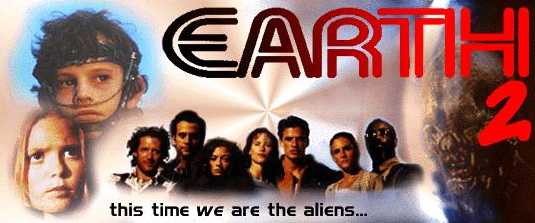
Earth 2's lack of recognition
TV Guide selected Earth 2 as one of the four shows in its 1995 annual Save Our Shows campaign, in which the magazine's editors highlight quality television series which are receiving poorer ratings than they deserve. In their April 1, 1995 issue, they described Earth 2 as "half Star Wars action, half Little House on the Prairie warmth" and noted that one reason it received poor ratings was that it was up against such powerhouses as 60 Minutes and America's Funniest Home Videos.
What the TV Guide article failed to mention is that Earth 2 was also being mistreated by NBC, who, typically, knew not what they had. (Sound familiar to any Trekkers?)
First, the network marketed it to the testosterone fanboy crowd whom they expected to watch anything called "science fiction," placing it right after football on Sundays. But the major fan base of Earth 2 ended up being mostly women. NBC should have marketed Earth 2 to the same crowd who watched Beauty and the Beast, Dr. Quinn, Medicine Woman and soap operas. Most techno-oriented science fiction fanboys thumbed their noses at it because it wasn't full of testosterone and explosions like all the other garbage out there.
The second thing NBC did was preempt it (meaning they chose to shove Earth 2 out of the way in favor of other programming) far too often. During its 21 episodes, NBC preempted Earth 2 nine times. That's 43% of the time, almost half! And that doesn't include the times it was delayed by overrunning football and basketball games, which messed up the schedules of those of us who sometimes had commitments on Sunday nights and had to rely on the VCR. Additionally, two of the episodes were shown out of order, after the season finale! That's no way to build an audience.
List of Earth 2's air dates and its preemptions
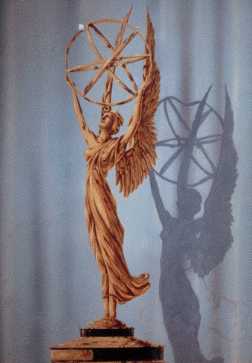
The pilot episode, "First Contact," was a two-hour premiere, for which Earth 2's special effects supervisor Kevin Pike won an Emmy for "Outstanding Individual Achievement in special visual effects." This was Earth 2's only Emmy.
"First Contact" was also nominated for "Outstanding Individual Achievement in sound editing for a series," and the episode "After the Thaw" was nominated for "Outstanding Individual Achievement in makeup for a series."
Universal Television, thinking the reason for Earth 2's low ratings was producer Michael Duggan, fired him at the end of the season and came up with a second-season promo, which described an Earth 2 completely redesigned from top to bottom. They billed it as "Rethought, retooled, remarkable!" To which we fans added, "Revolting!" and "Regurgitated!" It was truly, truly awful. I haven't met a person yet who didn't stare open-mouthed at the second-season promo the first time they saw it, wondering how anyone could come up with such drivel.
To NBC's credit, they told Universal they wanted the same show back, or not at all. So Universal pulled the plug, and that was that: 22 light years and 22 hours of television. That's all we got.
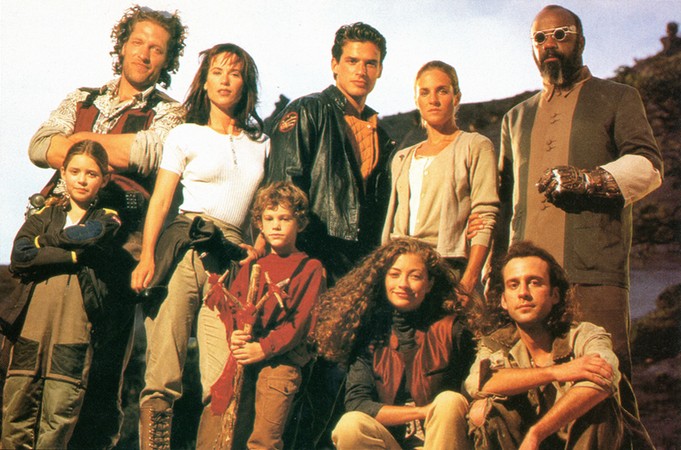
Why Earth 2 is wonderful
Everything just seemed to come together for Earth 2, being one of those projects where all the right people came along at just the right time to produce something extraordinary. The writing, acting, directing, cinematography, and music were all breathtaking. A hearty round of congratulations and "Thank you!" goes to everyone involved with Earth 2. It's a shame it only lasted one season.
Earth 2 was a show which operated on many different levels and had many different themes. Because of this, it's difficult to summarize.
Premise and characters
In the late 22nd century, mankind has trashed the Earth. Anyone with money lives on clean, safe, environmentally-controlled space stations orbiting the planet, and has done for several generations. People on the surface are left to fend for themselves. The only way they can earn passage up to the stations is by indentured servitude, amassing a huge debt which is passed on to their descendants and is almost impossible to pay off.
But the clean, sanitized space stations have a danger all their own. A mysterious, fatal disease called the Syndrome has reared its ugly head, striking only children who live on space stations. The general public, and even the medical community, are averse even to recognize the disease, and children who are stricken with it suffer a social stigma. What makes the disease even more mysterious is the theory that it is caused simply by a lack of nature. (This is not meant to be based on hard science; it is clearly an allegory.)
The government of the space stations, the Council, wants the disease swept under the carpet because its existence threatens their control. But one of the sick children is the son of an incredibly wealthy, independent woman named Devon Adair, who will stop at nothing to see her son survive. Since Earth is extremely polluted and dangerous, her only option is to strike out across the stars to a new, unspoiled world to start again, hoping a natural environment will cure her son, Ulysses.
Over 400 other families with Syndrome children want to join her, eager for this potential cure, so Devon uses her vast wealth to form the Eden Project, designed to colonize an uninhabited planet called G889, 22 light years away. The fact that G889 has no native intelligent species already occupying it is an important factor.
Eden Project will colonize the new planet in two stages. The first stage, known as Eden Advance, consists of a small group of people. They travel at near-light speed to reach the planet in 22 years, submitting themselves to suspended animation to make the journey. They plan to establish a settlement called New Pacifica on the western shore of one of the continents. The remaining families, about 1,000 people in all, follow in a slightly slower ship, intending to reach the planet two years later.
In addition to the Eden Advance team, the advance ship also carries a pilot and many crew members. These people are hired hands who have no ties to Eden Project, and they intend to return to Earth after dropping off their passengers and cargo.
When Eden Advance reaches the planet, they successfully drop their communication dish onto the beach at New Pacifica. But when it comes time to drop their cargo pods to the surface, the ship malfunctions. The cargo pods fail to release. They pull the ship into the atmosphere. Everyone aboard scrambles into three evacuation pods and escapes as the ship is destroyed. The escape pods land miles apart from one another, and the cargo pods scatter across the entire planet.
The story follows the people who escaped in two of the evacuation pods (we don't discover the fate of the third evacuation pod until later in the season). These people find each other and desperately stay together for survival. About half of this group are colonists and the other half are hired hands, and none of them are happy. They have hardly any supplies or food. They're thousands of miles from New Pacifica, where the other colonists will expect a fully-functioning settlement when they arrive two years later. The hired hands resent being stranded with the colonists. The pilot has a broken leg and cannot be moved easily, and he sinks into a deep depression.
Then they discover the planet is inhabited by a native intelligent species, after all, and that changes everything.
The main characters are:
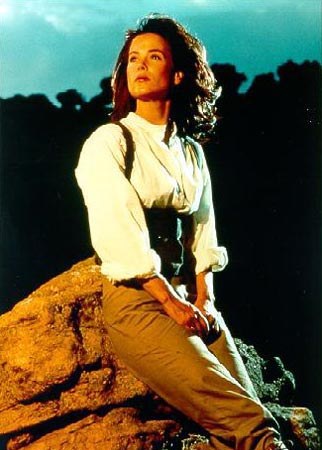 |
| Devon Adair |
| (Debrah Farentino) |
| Founder of the Eden Project. Accustomed to leading and not used to taking "No" for an answer, she is head-strong and willing to take on the universe to save her son. She is the first to extend the hand of friendship to the planet's natives, willing to believe in their good nature. |
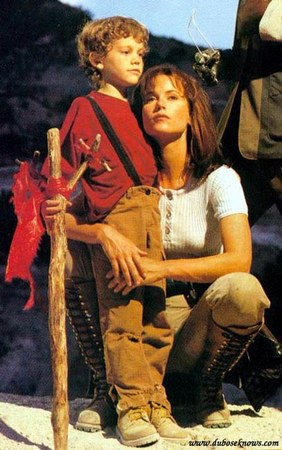 |
| Ulysses Adair |
| (Joey Zimmerman) |
| Devon's eight-year-old son. Cured of the Syndrome by the planet's natives, he occasionally senses things he can't explain. |
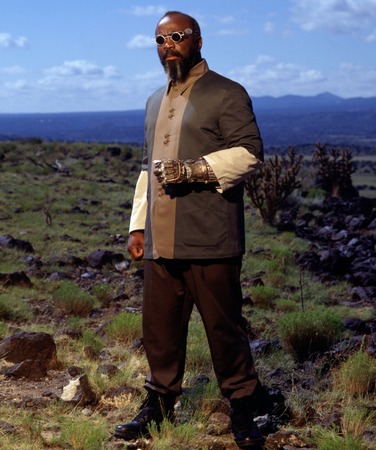 |
| Yale |
| (Sullivan Walker) |
| An ex-criminal who was artificially rehabilitated by being mindwashed, he is Ulysses's personal tutor. Yale is destined for some great surprises on G889 when his past comes back to haunt him. |
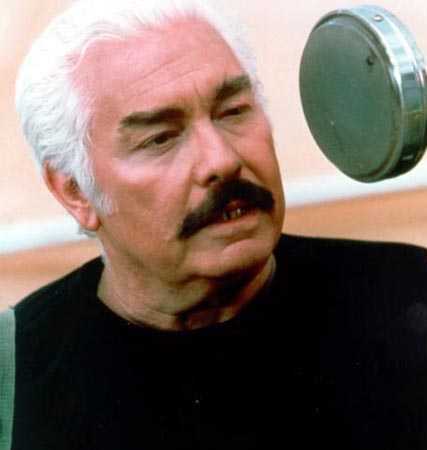 |
| Broderick O'Neill |
| (Richard Bradford) |
| Devon's no-nonsense, rough and tough right-hand man. His shoot-first-ask-questions-later attitude doesn't cut it on a planet which can shoot back. |
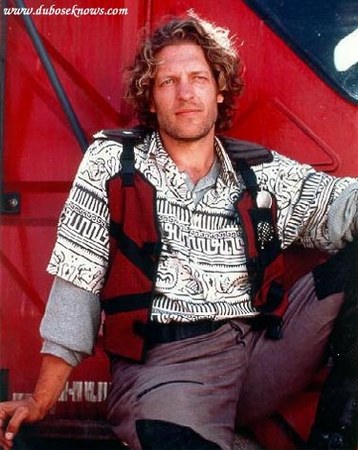 |
| John Danziger |
| (Clancy Brown) |
| Chief of the ops crew (the hired hands on board the space ship). A mechanic, a good father, and an all-around level-headed leader, but biased against aliens. He resents being stranded, and often butts heads with Devon Adair. |
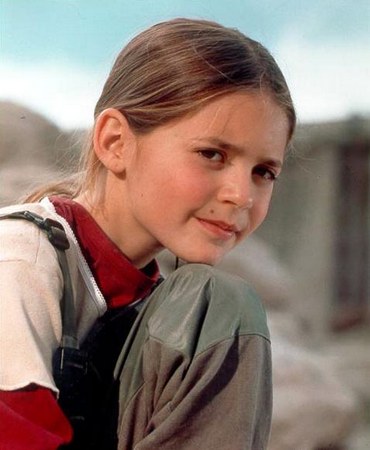 |
| True Danziger |
| (J. Madison Wright) |
| John Danziger's ten-year-old daughter. Feeling lost and alone while stranded on the new planet, this bright young girl becomes vulnerable as she struggles to find her place. |
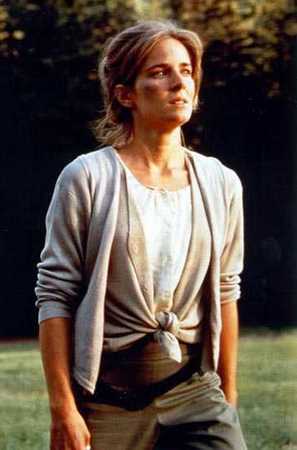 |
| Dr. Julia Heller |
| (Jessica Steen) |
| The only doctor on the advance team and fresh out of medical school, Julia must prove herself in an alien environment. Her icy exterior hides a desperate internal struggle. |
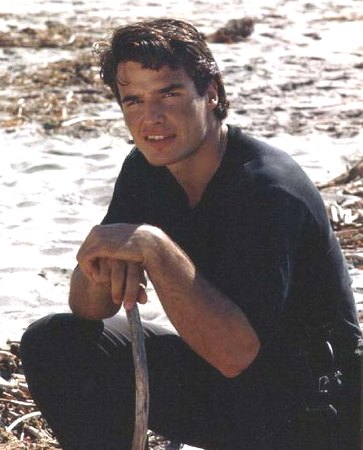 |
| Alonzo Solace |
| (Antonio Sabato, Jr.) |
| The ship's pilot. Faced with depression and his fear of the aliens, he is the one whom the natives of G889 choose to contact first. |
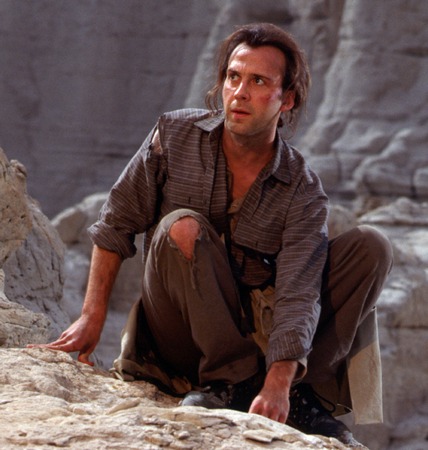 |
| Morgan Martin |
| (John Gegenhuber) |
| The official liaison between Eden Project and Earth's government. A bureaucrat. Sarcastic and selfish, his greed and his bumbling ways lead him into trouble, challenging him to discover the good nature he has buried deep inside. |
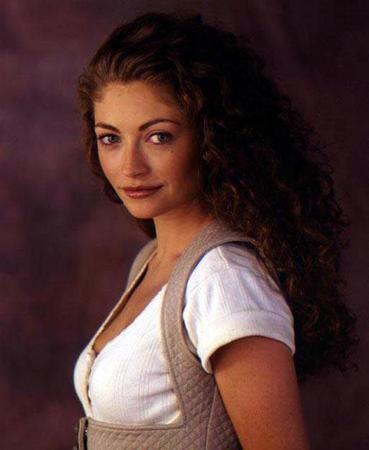 |
| Bess Martin |
| (Rebecca Gayheart) |
| Morgan's wife, the only one in the group who grew up on Earth instead of on a space station. Her simple way of looking at things, and her inner strength and resolve, become a valuable asset to the colonists. |
Other regular cast members are (going left to right in the picture below): Walman (Walter Norman), Baines (Rockmond Dunbar), Cameron (Kirk Trutner), Magus (Marcia Magus), Eben Singh (Erin Murphy), Mazatl (Freddie Lopez), and Denner (Danielle Fisher). The final regular character is a labor robot known as Zero (Tierre Turner). These characters are never at the forefront of the stories, and some of them have no speaking lines at all, which is a shame. Had the show lasted another season in its original format, I'm sure we would have gotten to know some of them better.
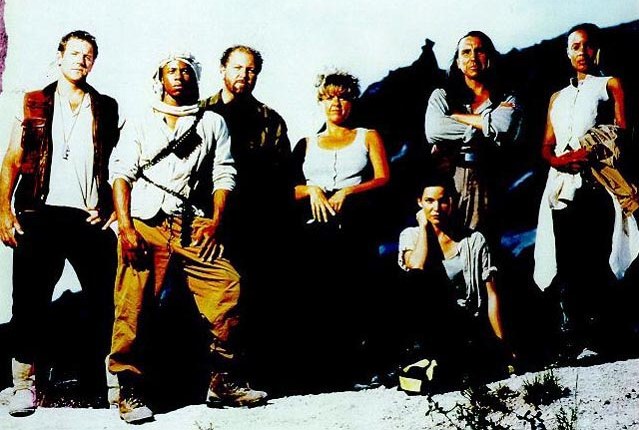

Devon Adair, the tough, wealthy idealist, and John Danziger, the level-headed blue-collar worker, naturally assume leadership positions within the group. They often find themselves at odds over the course of action to take on any given problem. They are both intelligent and they both care a great deal, but they still see things from completely different perspectives.
The group manages to salvage a few vehicles and supplies from one of the crashed cargo pods, just enough to survive. But then they meet the Terrians, G889's mysterious natives (usually played by Brian Steele and Russell Werkman).
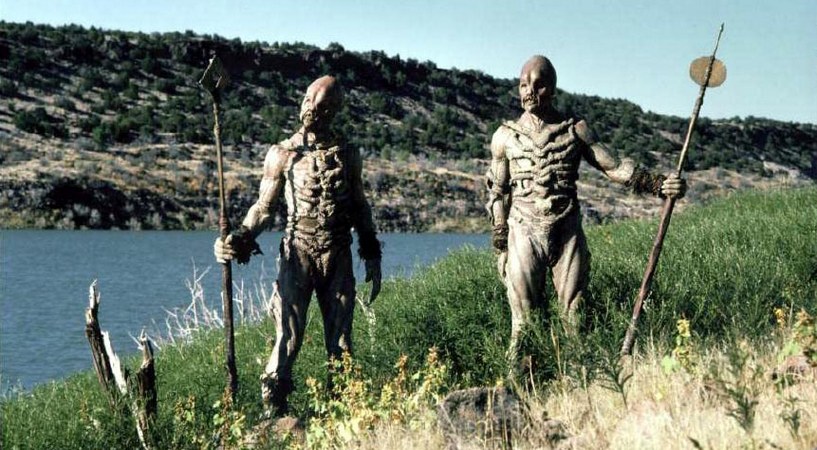
Terrians have a culture and a mode of thought so incredibly different from our own that much of the entire series of Earth 2 sees the humans trying to find ways to communicate with them. The Terrians are frightening, but it is slowly revealed that they mean no harm, and in fact, they possess a wisdom which humans lack.
Not only that, but the entire planet of G889 seems to be a living thing, and the Terrians have a deep affinity with their world. They travel through the ground as easily as fish swim through water and birds fly through air, and they communicate only through dream images and feelings. Although they possess no technology that we can see, they each carry an intricate staff, and they have the ability to fire bioelectric energy blasts from these staffs when they feel threatened.
The colonists also have to deal with Grendlers (below left), strong semi-intelligent beasts who love to collect things. The Grendlers were played by Jeff Deist and Lisa Ebeyer. Another life form was a koba (below right), a small, cute animal who could really pack quite a sting.
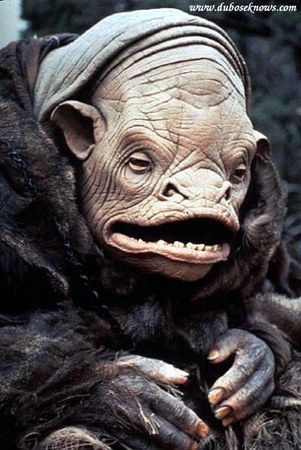 |
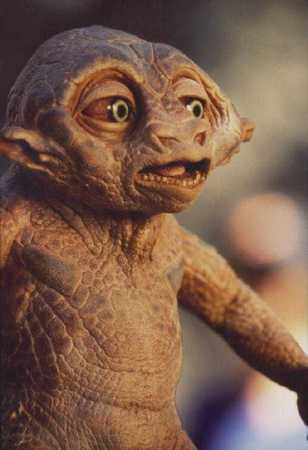 |
The Terrians take Ulysses and cure him of the Syndrome, establishing a bond with humanity as they do.
Overcoming their differences and wondering about all the new life on this planet, the humans form a united group and begin the 3,000-mile journey to New Pacifica, hoping to reach it in time to establish a settlement for the other colonists.
Underlying themes
The entire season of Earth 2 deals with this cross-continent journey, which is symbolic of the inner journeys each of the characters undergoes along the way. There is so much going on in this show: commentary on sociological differences and the abuse of power; romance; bigotry; the power of acceptance; individual growth; the need to stay in contact with nature; and so much more, including a lot of surprises it would be unfair to reveal here to the new viewer.
And what is really special about Earth 2 is that very few of these things are preached or shown blatantly. For instance, despite the obvious message that nature is valuable to all of us, the show never once tries to display technology as something bad, or as the antithesis of nature, which is something a lesser show might do. Facts about the devastation of Earth, such as "environmentally red-tagged areas" and "the faith wars of the early 21st century" are simply alluded to without any exposition, allowing the viewer to pick up on them. The viewer is left to interpret them in their own way.
Rebirth is a powerful message of Earth 2. Everything about the show is optimistic about humanity's future, without being grandiose or getting into the dry sociological debates which can drag down other shows. The rebirth is never really talked about, it's just shown, in a very character-driven, simple, beautiful way. Humanity is displayed as a little child, learning and growing, grasping at maturity after nearly destroying itself in its arrogance.
Earth 2 unashamedly and unapologetically shows an afterlife. But like everything else, the concept of an afterlife is simply shown briefly in a few scenes in a matter-of-fact way, not making a big deal of it. It is never overtly mentioned nor crammed down the viewers' throats.
One of the most pervasive, universal themes within the show is that of the bond between parent and child. If there's one thing which unites all people everywhere, it's that we each have (at least physically) a mother and a father. Regardless of whether these mothers and fathers were good or bad, present or absent, abusive or supportive, sane or insane, we had them. The subject of what our parents mean to us is something everyone on the planet can relate to in one way or another. It is the single most universal dramatic theme the human race has.
Almost every Earth 2 episode deals with the subject of parentage, sometimes in subtle ways. The Terrians call the planet their mother. Devon Adair and John Danziger are faced with the daily trials of bringing up their respective children. Julia Heller has a mother on the Council whom she may be trying to live up to. Bess almost ends her marriage with Morgan over the fact that he never treated her father with respect. In one of the most emotional scenes in the series, Danziger tells True the truth about her mother. Halfway through the season, the group meets a girl named Mary, whose dead parents appear as ghosts because they can't rest until they know she's all right.
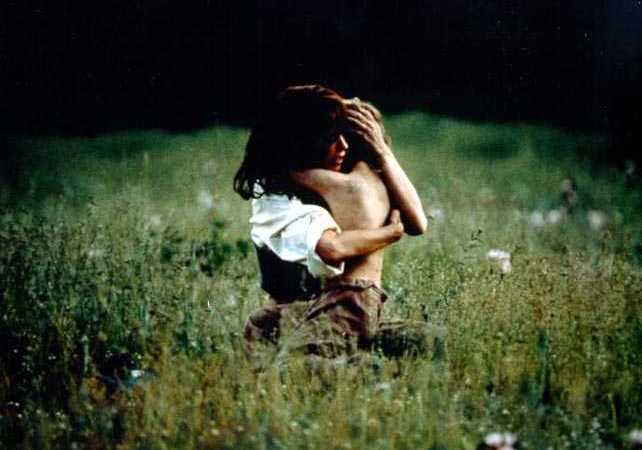
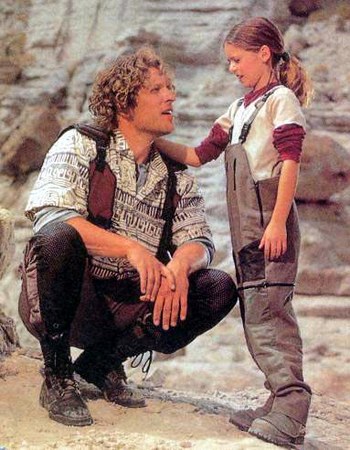
Every Earth 2 character is realistic, having good days and bad days, making good decisions and bad ones, with assets and flaws. Much of the show deals with the characters attempting to survive and to learn about themselves.
To that end, the planet of G889 is virtually a character in its own right, often representing a higher power with much to teach us if we would but listen. The most basic, constant theme is the fact that the planet is changing the characters. They come to colonize G889, and what they find, in more ways than one, is themselves.
|
"It's an extraordinary new world, and survival is simply a question of whether we can reach deep enough to find the extraordinary in ourselves." |
|
Morgan Martin, "Better Living Through Morganite" part 2 |
A detailed synopsis of my favorite Earth 2 episode
Acting
The cast of Earth 2 is just plain awesome. Debrah Farentino does a very good job playing Devon Adair, and the bright young actress J. Madison Wright brings True Danziger to life in a way that is astonishing. Joey Zimmerman is a talented young man with a long resumé even then, and is a pretty good improv comedian. At eight years old, his performance as Ulysses is hampered only by his youth. Sullivan Walker does a wonderful job playing Yale.
But most people regard the three finest actors on Earth 2 to be Clancy Brown, Jessica Steen, and John Gegenhuber. They really shine, bringing a lot of talent to the screen, and Jessica Steen won a Gemini Award (the Canadian equivalent of the Emmy) in 1996 for a TV movie called Small Gifts.
In one of the single best performances I have ever seen, Clancy Brown, as John Danziger, breaks down crying as he begs a hostile creature to take his life instead of his daughter's. Even the other actors and crew members on the set were spellbound as he delivered his performance.
Richard Bradford is very good as Broderick O'Neill, and Kelli Williams is wonderful as Mary, the human orphan raised by Terrians. Tim Curry is a creepy and psychopathic Gaal. Terry O'Quinn does a great job playing Reilly, and Jeff Kober somehow plays an emotionless character (the ZED) with a smidgen of emotion, which can't be easy. But two guest performances deserving of a standing ovation are that of Julius Carry and LaTonya Richardson as the married couple Alex Wentworth and Les Firestein, in the episode "Memory Play." They are superb.
Music
Earth 2's opening title sequence is the most beautiful on television. Part of that is attributable to the stunning cinematography, and the rest is due to the music.
David Bergeaud (pronounced Bear-zho) composed all the music for Earth 2. Except for the pilot episode and the main theme song, for which Universal Studios hired a full orchestra, Mr. Bergeaud also performed all the music singlehandedly, using makeshift instruments around his house and exotic instruments from around the world!
His music is breathtakingly simple, melodic, and gorgeous. He comes up with the perfect music to fit the mood of each scene, never using electronic instruments. For action scenes, he uses loud trumpets or percussion. For soft scenes, he sometimes plays a simple tune on a flute.
Sound
In scenes with no music, you can often hear the planet. This is extremely important, especially as the planet itself is often alluded to as a changing force in the lives of the characters.
In the background of scenes which are inherently quiet, you can hear wind, the whisper of leaves, the sound of people's feet walking on the ground or through grass, the rustle of the nearby creek, the odd bird. Other television shows would not have included these sounds, but the producers of Earth 2 wanted them. These sounds are a very subtle, very powerful way of helping to transport the viewer to the world of G889, and this increases the realism of the show a hundredfold.
One of the best uses of sound is during one of True Danziger's conversations with Gaal, a recurring character played by Tim Curry. She and Gaal discuss the concept of "good" and "bad" one night, and Gaal tries to turn True to his side and against her father. The conversation is made eerily realistic and magical because they are beneath a canopy whipping strongly in the wind. It's nothing the viewer notices overtly, but when I see and hear that flapping canopy, I swear I feel a brisk wind in my living room. It's a nice touch which really increases the mood and effectiveness of the scene, without distracting the viewer.
Cinematography
The shots used in Earth 2 are gorgeous, showing fields, mountains, trees, desert, and sky with equal beauty. One of Earth 2's most striking images comes from the opening title sequence, showing Ulysses Adair running in slow motion across a plain, silhouetted against a sunset which fills the screen. Time-lapse film of clouds or sunsets are used between scenes. When all these shots are joined with Mr. Bergeaud's music, the combined effect is superb.
Most science fiction films and television shows are depicted in dark, gritty environments, using dim lighting to accentuate a claustrophobic mood and a dire situation (as if they don't have light bulbs in the future!). Earth 2 is a brilliantly refreshing change from this overabundance of dark grittiness by showing that bright blue skies, running creeks, and broad green vistas mix with science fiction just fine. Earth 2 is dark at night and bright during the daytime, unless it is raining, in which case it is dim. It's that simple. This does not detract from the story or from the threats the characters face one bit.
To get all these wonderful outdoor shots, and to make Earth 2 different from other shows, the producers took it away from Hollywood. They filmed around the area of Santa Fe, New Mexico, to be precise, often filming on Native American reservations and national parks, such as Nambe Pueblo, Tent Rocks, Santa Clara, Plaza Blanca, White Mesa, and Chamisa Trail.
Directing
The directing is unusual and ingenious. Sometimes, when two characters speak in virtual reality (a futuristic way of communication), they speak right into camera, as if the viewer is the person to whom they're speaking. Some might consider this jarring, but it turns out quite well. I never even noticed it at first. Sometimes a long scene is filmed in one continuous shot instead of short takes edited together, which is another bold move. Wide, sweeping shots are often used.
Many fans agree that the best-directed episode is "Survival of the Fittest," which was both written and directed by John Harrison, who would go on to direct Dune for the Sci-Fi Channel in late 2000. The episode uses clever camera segues to take the viewer into flashbacks and then bring them back again, using the flashbacks to tell an ever-changing story.
Writing
The writing is superb. Since I wasted half my childhood planted in front of the TV screen like a vegetable, re-used plots are old acquaintances of mine. But most Earth 2 episodes skirt the obvious paths and veer off in startling new directions. The drama is beautiful and thought-provoking, yet always realistic. The characters behave like real people, not cardboard cut-out caricatures. The relationships among the characters are layered and complex, and a fair amount of interplay among them is unspoken. I would place the drama of Earth 2 alongside any other critically acclaimed, award-winning dramatic television program as something equal in quality, if not better.
One important aspect of the series, and a huge gamble as far as I'm concerned, is the inclusion of children in the main plot. Children are risky because they can drag a program down very quickly if their characters are not handled carefully, but Earth 2 has not just one, but two children in its starring cast. What's more, these children are written as real children – they're good people, resilient, self-centered, vulnerable, and naive, each in their own way. Even considering the way in which the Terrians change Ulysses, neither child becomes a super-human prodigy who saves the group from destruction every week, nor are they forced to grow up overnight for the sake of audience (or production) convenience.
Almost every episode is narrated by one of the main characters. Each main character narrates at least one episode. Two episodes have no narrators.
Earth 2 actually has a lot of hard science fiction and technology, but this technology is never the focus. Like our present-day technology, the characters never think much about the gadgets they use. The stories are always about the people.
Although Earth 2 has a few continuity errors throughout its season, the background detail was carefully constructed from the beginning. Plot lines which don't arise until much later are hinted at early in the season. The episodes tell a continuing, progressive story, resisting the use of the infamous reset button of other television shows.
The Terrians and symbolism
There is no finer example of a truly alien race in science fiction television than the Terrians of Earth 2, a race so strange they don't think even remotely like humans. The Terrians are a race with many beliefs and ways of existence which are still mysteries to the audience when the series ends. Earth 2 goes far beyond the cliché of calling a biped creature with a different nose who can speak English an "alien." The Terrians do not have human mannerisms. They do not have a language which can be interpreted. Their community and existence are far too complex to sum up in a sound byte. And dammit, Earth 2 deserved an Emmy for this bold stroke alone!
Dramatically, the Terrians represent several things. The traditional beliefs of many cultures on Earth, such as many Native American tribes and the Aborigines of Australia, include a belief in our connection with the land, and of the dangers of severing that connection. The Terrians' simple ways and simple wisdom is the perfect counterpoint to the humans fleeing the sanitized safety of artificially-controlled environments, and in this respect, the Terrians are the mirrors of the human characters. One episode even suggests the Terrians used to be like us, "millions of years ago."
And yet, for all their wisdom and simplicity, even the Terrians are shown to be imperfect, just like the other characters. In "Better Living Through Morganite" part 2, Yale, Devon, and Alonzo try to convince the Terrians that, as Yale says, "Everything you know doesn't come from these rocks. The truth is never that simple."
The Terrians are a vital part of Earth 2, and the relationship between them and the colonists is forged slowly, brilliantly, with mistakes made by both sides, just like relationships in real life.
How much of Earth 2 was influenced by the substantial Native American cultures which permeate New Mexico, I don't know.
Danziger's mistrust of anything alien, the Terrians' connection with their land, their different mode of thinking, Eden Advance's westward cross-continent journey, and the fact that they grow dependent upon the Terrians while remaining frightened of them at the same time, all lead me to believe that Earth 2 is an allegory for the way Europeans settled the United States: pushing the red man further westward because he was different, and alternately allying themselves with, then fighting, Native Americans. My belief in this allegory is strengthened by Earth 2's many references to the 16th-century lost colony of Roanoke.
Hidden references
Several names of people, places, and things in Earth 2 contain hidden meanings. Many of these are subtle references to Roanoke, the lost colony in 16th century North America. This colony is heavily associated with Virginia since it was in the Virginia Territory, even though its location is actually in present-day North Carolina.
Earth 2's advance ship is called the Roanoke (according to the script of the pilot episode; the name is not actually seen on screen). The original colony of Roanoke was founded by Anais Dare, and if you say his name as first initial and last name – A. Dare – you get the last name of Earth 2's leader, Devon Adair. Devon's first name represents the county in England from which many of Roanoke's settlers came. The jackets of all the hired hands were tagged with the call sign VA-1587 – "VA" being Virginia's postal code, and 1587 the year Roanoke was founded.
The name Morgan could be related to the word morganatic, which means "Of or being a marriage between a person of noble birth and a partner of lower rank in which it is agreed that the partner and any offspring share no titles or estates of the noble partner." This would fit the character of Morgan Martin, who possibly jeopardized his chances of promotion by marrying Bess, a woman from Earth and therefore of much lower social standing than anyone from the space stations.
The character of John Danziger, the blue-collar mechanic who was always a thorn in Devon's side, might have gotten his name from the city of Danzig, Poland, renowned as a place of worker uprisings.
The villainous character Gaal might have been so named because Gaal means "abomination," "contempt," or "loathing" in Hebrew. In the Old Testament, Judges 9:22-46 mentions a man named Gaal, apparently an evil spirit sent by God to stir up trouble between two groups of people. (And thanks to Earth 2 fan Lia Faile for that info.)
And last, but not least, is the reference to Garsonia Starbase in the episode "Natural Born Grendlers." I don't think it's much of a coincidence that this name sounds similar to Garson Studios, where many of Earth 2's indoor scenes were filmed. Founded by Greer Garson, these studios adjoin the campus of the Santa Fe University of Art and Design. If you think of a production studio as a "base for stars" (celebrities), you'll catch the extra pun. So clever!
Summary
All these things make Earth 2 an unusual, refreshingly different television show. It has so many aspects and themes. It is beautiful, thoughtful, intelligent, well-acted, well-directed, and almost flawlessly executed. I find it emotionally rewarding and spiritually enriching. It changed my life significantly, and I am forever grateful to all the people who made it.
May the journey continue.
